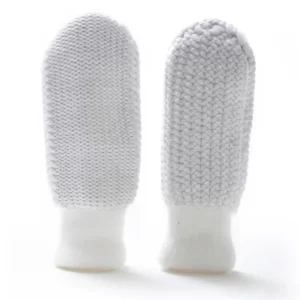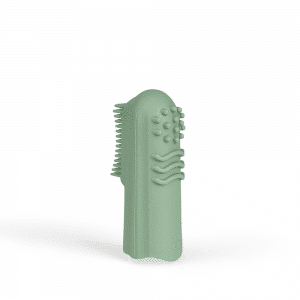In this blog post we would like to talk about an important topic: Dental care for the little ones . Brushing babies' teeth can be a real challenge, but with the right tips it becomes a happy ritual. From gentle toothbrushes to child-friendly toothpastes, we explore the best ways to promote your baby's dental health. Find out how to integrate oral hygiene in a fun way and lay the foundation for a lifelong healthy smile right from the start.
Tips for brushing your baby’s teeth
Caring for your baby's delicate teeth is an important step in their development. In this article, we share tried-and-tested tips and tricks to make dental care a positive experience. Learn how to incorporate oral hygiene into your child's life and lay the foundation for a lifelong healthy smile right from the start. Follow these simple tips to support your baby's dental health and give them a bright smile. Healthy habits start in the first few years of life!
How do you brush your baby’s teeth?
- Gently and carefully: Use a soft brush or a finger cot to protect sensitive gums. Brush the teeth in small, circular movements to effectively remove plaque.
- Playful ritual: Make brushing your teeth a fun experience. Make the procedure playful to create a positive association and promote oral hygiene.
- Regularity is key: brush your baby's teeth twice a day - in the morning and before bedtime. Change the toothbrush every three months to ensure consistent, effective cleaning.
Brushing babies’ teeth – with or without toothpaste?
- Start with a minimal amount. You can discuss with your dentist whether you use a toothpaste with or without fluoride. The Federal Office for Agriculture and Food recommends a fluoride toothpaste.
- From the second birthday onwards you can switch to a pea-sized amount of toothpaste.
- Consult your pediatrician/dentist beforehand to choose the best toothpaste for your baby.
How long and how often should you brush your baby’s teeth?
- Start with the first tooth and brush the teeth twice a day – in the morning and before bedtime.
- A brushing time of about two minutes ensures thorough care.
The first toothbrush for your baby and the right toothpaste
Choosing the right “first toothbrush” and toothpaste is important for the healthy development of those delicate teeth. Here are some important tips to help you get the perfect start to your baby’s oral hygiene.
Before the first toothbrush: If your baby is teething or the first teeth are already showing, you can use an oral care finger cot to get them used to dental care and support them during teething. The " Silver Fairy " is not just suitable for supporting teething. You can use the coarse side to gently clean your baby's first teeth. With the finger cot you can feel exactly how much pressure you need to apply so as not to injure the gums.
The first toothbrush for your baby: It's time to take the first step towards healthy teeth! Choose a particularly soft baby toothbrush. The delicate bristles protect sensitive gums and make brushing a pleasant experience. A finger toothbrush, for example made of natural rubber, is the perfect first toothbrush. You can "put on" the finger toothbrush and use it to gently brush your baby's teeth. This way you always have control and don't apply too much pressure. At the same time, you get your baby used to the ritual of brushing teeth.
Brushing babies’ teeth with the right toothpaste: Choosing a suitable toothpaste is just as important. Start with a minimal amount of toothpaste recommended by your dentist. From the second birthday onwards you can switch to a pea-sized amount. Before making this decision, it is advisable to consult your pediatrician or dentist to choose the best toothpaste for your baby.

- A massage and cleaning site
- To get used to daily dental care
- Oral care finger cot remains antibacterial thanks to silver treatment*

- For gentle tooth cleaning and gum massage
- One massage and one cleaning side per finger toothbrush
- Ideal fit thanks to expansion joints and elastic material
Should I massage my baby's gums?
Yes, massaging your baby's gums can be a positive and supportive measure for oral health, especially when the first teeth come through. Here are some reasons why massaging the gums can be beneficial:
- Relief of symptoms: Gently massaging the gums can help relieve any discomfort or pain that may accompany teeth eruption.
- Promoting blood circulation: Massaging the gums can stimulate blood flow, which can help keep gums healthy.
- Getting used to touch: Regular massage helps your baby get used to being touched in the mouth area, which can make brushing teeth easier later on.
- Relaxation: The gentle massage can have a calming effect on your baby and create a positive experience related to oral care.
If you want to massage the gums, use clean, soft fingers or a special finger cot for dental care. Make sure you wash your hands thoroughly beforehand. Use gentle, circular movements and observe your baby's reaction. If your baby shows any signs of discomfort, stop and try again later. It is important to be gentle and sensitive to promote your baby's oral health.
Alternatively, you can give your baby a Give your baby a teething ring, for example made of natural rubber . This way he or she can decide for himself or herself when he or she wants a massage.
If your baby refuses to brush his teeth
Many parents are familiar with this situation: your sweet baby simply doesn't want to have his teeth brushed. But don't worry, you're not alone! Refusing to brush your teeth is a normal phase of development and there are ways to overcome this challenge in a playful way.
Make a game out of it: Turn brushing teeth into a fun game. Let your baby hold the toothbrush or finger cot with one finger or sing a song together. A positive atmosphere can quickly transform aversion into curiosity.
Choose the right time: Find the perfect time to brush your teeth. Some babies are more open in the morning, others are more cooperative in the evening. Experiment and find out when it works best for both of you.
Offer a selection of toothbrushes: Let your baby choose between different toothbrushes. Sometimes it is the color or the shape that piques his interest. Being able to choose gives the baby a feeling of control.
Get used to it slowly: Start with small steps. Familiarize your baby with the toothbrush before you start brushing. Let your baby explore the brush and gradually get used to the process.
Be a role model: Children learn a lot through imitation. Show your baby how you brush your teeth. He will be curious and may want to imitate you.
These tips are not only intended to make brushing teeth easier, but also to encourage a positive attitude towards oral care. With love and patience, brushing teeth will soon become a relaxing ritual for you and your baby.
